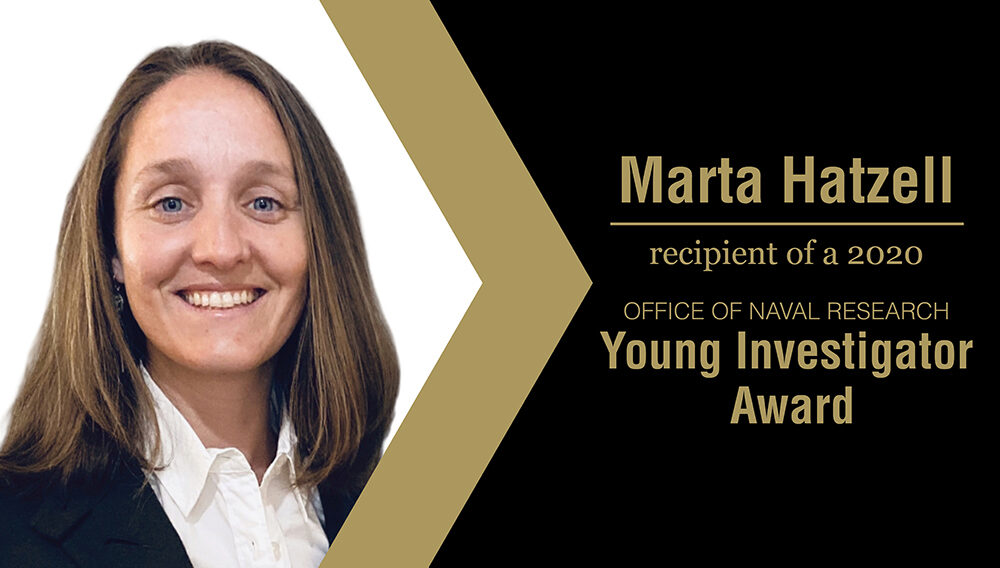
Assistant professor Marta Hatzell has received an Office of Naval Research (ONR) Young Investigator Award for her research project entitled “Electric Eel Inspired Energy Generation to Enable Underwater Artificial Gills.”
The long-term goal of Hatzell’s work is to develop an energy generation device that would power artificial gills for Navy divers. The chief motivation is to eliminate the need to for navy divers to carry oxygen tanks, and to develop systems that mitigate decompression illness.
Hatzell proposes that the development of an inexhaustible energy source to power artificial gills for divers must be able to utilize mission abundant feedstocks, such as NaCl and water, to generate power and ultimately oxygen. This is in contrast with state of the art energy generation devices, which are exhaustible, reliant on rare elements and heavy. Her proposed energy generation device is inspired by energy generation that occurs through the controlled mixing of salt (NaCl) within electric eels.
Electric eels use natural salinity gradients within their body to generate electrical energy with peak powers that approach 1 kW. Power generation occurs within an eel’s electric organ. This organ contains a series of electrocytes that are separated from extracellular space by a very thin lipid membrane. The electrocytes contain saline solution, which is higher than the salinity of the adjacent extracellular space. This creates a driving force between the chambers, as the system is not at an equilibrium. The ion selective lipid layer prevents free diffusion and only allows for ion movement through controlled electromigration. Similar to an electric eel, reverse electrodialysis (RED) aims to convert controlled ionic mixing to electrical energy. Reverse electrodialysis accomplishes this task through the use of ion exchange membranes which separate two feeds with different salinity. This chemical potential gradient generates a membrane potential, and when a significant number of membranes are placed in series, the ionic flux can be converted to electrical energy and/or fuels (O2 and H2) through redox-based electrodes (electrolysis). Current state of the art membranes are not able to generate enough ionic current to generate oxygen at a rate desirable to navy divers (2 L/min). Thus, the fundamental aim of Hatzell’s work is to aid in moving ion exchange membranes closer to this goal.
The ONR Young Investigator Program was established in 1985 and is one of the nation’s oldest and most selective basic-research, early-career awards in science and technology. Its purpose is to fund tenure-track academic researchers, or equivalent, whose scientific pursuits show outstanding promise for supporting the Department of Defense, while also promoting their professional development. Typical grants range from $510,000 to $750,000 over a three-year period.
“Professor Hatzell is having an outstanding year and we are very proud of her. She is helping build a strong program in ME and becoming a leader in her field,” said Samuel Graham, Chair of the George W. Woodruff School of Mechanical Engineering. “We are looking forward to her continued success at Georgia Tech and supporting her future growth.”
Hatzell is an Assistant Professor in the George W. Woodruff School of Mechanical Engineering. Prior to starting at the Georgia Institute of Technology in August of 2015, she was a Post-Doctoral researcher in the Department of Material Science and Engineering at the University of Illinois - Urbana-Champaign. During her post doc, she worked in Paul Braun’s Research group on research at the interface between colloid science and electrochemistry. She completed her PhD at Penn state University in Bruce Logan’s Research Group. Her PhD explored environmental technology for energy generation and water treatment. During graduate school she was an NSF and PEO Graduate Research Fellow. Currently her research group focuses on exploring the sustainable catalysis and separations, with applications spanning from solar energy conversion to desalination. She is an active member of the American Chemical Society, the Electrochemical Society, ASEEP, and ASME. Hatzell was awarded the NSF Early CAREER award in 2019 for her work on distributed solar-fertilizers, attended the 2019 US Frontiers of Engineering Symposium through the National Academy of Engineering, and was awarded the 2020 Sloan Research Fellowships in Chemistry.